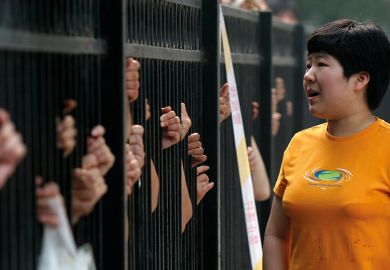China’s ban on private tutoring might not improve equality of access to leading universities, experts said.
Earlier this month, the Ministry of Education said it would check to ensure that online tutoring organisations were not violating rules it had issued in July that banned for-profit tutoring on core curriculum subjects and also urged schools to assign less homework to reduce students’ stress.
Yang Rui, a professor in the Faculty of Education at the University of Hong Kong (HKU), said the shift reflected how “the government is recognising that education anxiety is a prominent issue among the public”.
But Yan Chen, Daniel Kahneman collegiate professor in the University of Michigan’s School of Information, who has done extensive research on Chinese college admissions, said that as long as securing a place in a top university depended on a good performance in the intensely competitive gaokao national university admissions exam, “robust demand for tutoring from parents” would persist.
She cited a web page where a sponsored advertisement next to an article about the ministry’s rules linked to an online tutoring website, which “demonstrates the demand and supply of private tutoring even under the new policy”.
Xu Zhao, director of research in Chinese youth mental health and well-being at the University of Calgary’s Werklund School of Education, agreed.
The new rules, she said, “do not change the test- and competition-based education system, nor the job markets that rely on educational credentials in hiring”.
“Without increasing government investment in quality education for all, educational disparity and anxiety among Chinese students and parents will not be reduced, but more likely increased by the lack of options of support for the majority in preparing for the high-stakes tests,” Professor Zhao said.
“Families who have more resources will find ways to go around the policy, and the gaps between the haves and the have-nots will increase. Higher education, especially seats in the prestigious universities, would be less accessible for those who do not have resources and power.”
Michigan’s Professor Chen concurred. “Online education would help alleviate the inequality of education resources across regions and socio-economic classes. If these resources are restricted, regional inequality in education resources and outcomes will be widened, as will disparities in different social classes,” she said.
HKU’s Professor Yang said the ban on tutoring “needs to be supported by other policies to ensure educational fairness”.
“Ultimately, China has to qualitatively upgrade its public school education. This would be the best way to achieve educational equity and equality,” he said.
Yu Chen, lecturer in Chinese studies at the University of Sheffield, argued that the reforms “provide an opportunity to address regional educational inequality if more policies can be adopted to deal with the uneven distribution of school resources”.
“Such policies could include more resources for staffing and facilities in public schools in less developed regions, investment in after-school clubs, a mobility scheme which encourages good teachers to work in less-developed regions for a certain period, and more online training and educational resources available to staff and students in less-developed areas,” Dr Chen said.
“Both local and national investment in school education are important to address the regional disparities.”
Register to continue
Why register?
- Registration is free and only takes a moment
- Once registered, you can read 3 articles a month
- Sign up for our newsletter
Subscribe
Or subscribe for unlimited access to:
- Unlimited access to news, views, insights & reviews
- Digital editions
- Digital access to THE’s university and college rankings analysis
Already registered or a current subscriber?








